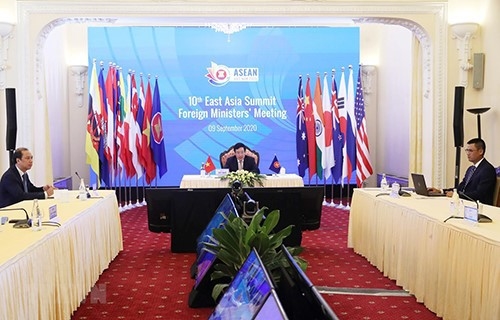In an interview granted to the Vietnam News Agency's correspondent in Jakarta, Mann said New Zealand adheres commitment to the international rules-based order and multilateral institutions to deal with transbourndary challenges, said Mann, who leads the Asia Pacific Regional Integration Division under the Ministry of Foreign Affairs and Trade of New Zealand.
Vietnam’s priority of advancing a “Cohesive and Responsive” ASEAN is most appropriate given the current challenges posed by COVID-19 in particular, she stressed, adding that New Zealand looks forward to continuing its close cooperation with ASEAN to advance the region’s recovery from the pandemic, and to support long-term peace, prosperity and stability.
    |
 |
|
Deputy Prime Minister and Foreign Minister Pham Binh Minh chairs the 10th East Asia Summit Foreign Ministers’ Meeting |
The central challenge ASEAN and New Zealand are all facing at this time is how to navigate through the COVID-19 crisis and build a more resilient region, one that is better able to withstand future shocks, she noted.
The official went on to say that New Zealand has been active in the region on restoring supply chains and keeping markets open to trade, and the country has encouraged its partners to resist calls for protectionism, which may seem sensible in the face of the economic challenge in many regional countries, but which history has demonstrated undermines growth and prosperity.
According to Mann, New Zealand views the East Asia Summit (EAS) as the preeminent regional political-security dialogue in the Indo-Pacific, and the country welcomes the opportunity it provides to discuss the most pressing strategic issues facing our region, from political and security matters, to economic and trade ones, through to issues of climate change and environmental security.
At the ASEAN-New Zealand Ministerial Meeting within the framework of the 53rd ASEAN Ministerial Meeting (AMM 53) and related meetings, New Zealand emphasized the need for fair and equitable access to vaccines, to maintaining supply chains and restoring connectivity, and working together to advance regional economic recovery, she said.
New Zealand finds the ASEAN Regional Forum (ARF) provides it with opportunities for practical cooperation on security challenges across the Indo-Pacific, especially those that require trans boundary action if they are to find solutions.
For New Zealand, priorities include counter-terrorism and fighting trans-national crime, cyber security, preventive diplomacy, maritime security and a host of other issues that threaten to undermine peace and stability across the Indo-Pacific, she stated.
The official said New Zealand’s long-standing support for ASEAN centrality stems from its belief that these ASEAN-centric meetings and forums play an important role in building confidence and trust, promoting understanding, and fostering practical cooperation, contributing to building and maintaining the conditions for peace and prosperity across the Indo-Pacific.
As always, for New Zealand, the country’s engagement with ASEAN is built on a foundation of reliability and honesty as a close friend, respect for ASEAN’s sovereignty and independence, and a desire to deepen two-way cooperation, she said.
New Zealand and ASEAN’s strong relationship is reflected by many linkages, she said.
The most recent data shows that more than 10 percent of New Zealand residents born overseas came from ASEAN member states. Last year, 7,555 international tertiary students in New Zealand came from across ASEAN, the latest in a long line of students going back many decades.
The trade and economic relationship between the two sides has been flourishing as well. In 2019, two-way trade between New Zealand and ASEAN was just under NZD 20 billion. New Zealand is providing NZD 225 million to ASEAN through its Overseas Development Assistance programs in 2020-2023.
Later this year, when the two sides celebrate their 45th anniversary of partnership, New Zealand expects to announce new programs that build on our traditional areas of focus but also expand into newer areas such as climate change and sustainability, she added.
Source: VNA